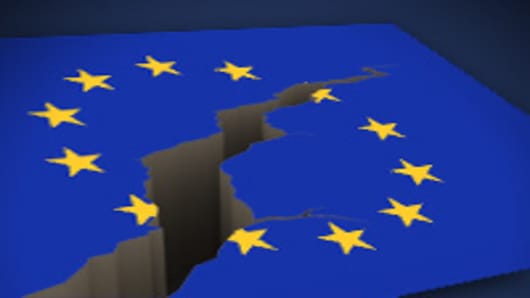A list of measures EU heads of state will likely sign off on later this week could very well entrench Germany’s strength at the heart of Europe and the weakness of those on the periphery.
The plan involves writing limits on public debt and deficits into national law, more flexible labor markets and a review of wage indexation.
Add to this a battle over corporate tax rates and the new rules could spark further problems down the road, rather than prevent another crisis.
As George Soros outlines in a commentary in Tuesday’s Financial Times, Europe could ‘set in stone’ a two-speed Europe that could eventually threaten the European Union's political cohesion.
"The European Union will suffer something worse than a lost decade," Soros wrote.
"It will endure a chronic divergence in which the surplus countries forge ahead and the deficit countries are dragged down by the burden of accumulated debt,” he said.
Ireland’s battle to hold on to its low corporate tax regimehas pitted the peripheral nation against less heavily indebted euro zone partners.
Needing to lower interest ratesit is paying as part of its bailout by the European Union and the International Monetary Fund, Ireland is being pushed into raising its corporation taxes by Germany and France who say if Dublin does not back down, the new government of Prime Minister Enda Kenny will not have a full basis point knocked off its borrowing costs.
The Irish for their part are refusing the back down, claiming that any attempt to force them to raise corporation taxes would make their economy even more uncompetitive at a time when they need all the help they can get.
The Irish have been hit very hard by thecollapse of their economy, banking system and housing market.
Having ridden the wave of cheap ECB borrowing costs in the good times the subsequent collapse of the economy has seen Ireland readily agree to write into law a provision that would put a break on state spending.
The Irish do not want to get into this position again, but cannot agree to raise corporation taxes, which currently stand at just 12.5 percent.
They believe the creation of jobs by attracting foreign companies is one of the few good things to have happened to the economy in recent years.
Europe’s German Problem
Looming state elections in Germanyhave made the debate even more fierce, with politicians keen to show voters at home they will not have to foot the bailout bill, only to see spend-thrift European partners undercut the German worker.
German voters will not allow their elected leaders to hand over their tax money without a fight, and Finance Minister Wolfgang Schaeubleand Chancellor Angela Merkel will fight a battle which many believe is just the in a fight for German domestic political opinion.
"When someone wants to change a contract which he has just agreed to, then he has to think not only about what the other party to the contract should change, but he must also come up with suggestions about what he can change himself" said Schaeuble at a meeting in Brussels Monday.
At face value the comments are a thinly veiled threat to Ireland but like most comments from finance ministers at meetings in Brussels where aimed at his own domestic audience.
Here is the problem, German voters are angry that they are having to pick up the bill. Now the German worker has a point. Germans have worked very hard to become the workshop of the world.
German manufactured goods are seen as the benchmark for quality from Beijing to Rio and as a result German exports have boomed on the back of a productivity drive that has been the envy of the world for much of the last decade.
Why should the hard working Germans give up their hard-earned cash to bail out Irish, Greek or even Portuguese workers who have been living the high life on cheap borrowing, higher house prices or generous government support since the creation of the euro?
Don’t Mention the Euro Bond
If fiscal policy is not to dominate the debate and potentially entrench a two-speed Europe, then a single bond market remains an option.
Soros is calling for the European Financial Stability Facility, the rescue fund created by EU member states, to be able to rescue the European banking system as well as member states in order to allow a restructuring debt without creating another banking crisis.
He also believes a so-called euro bond remains the best option for creating an even playing field, but this is the last thing the German public will accept.
“The German public is a long way from accepting it; yet it is needed to re-establish a level playing field.
This has to be made clear to give deficit countries hope they can escape from their deficit predicament if they work hard enough at it,” Soros said.
There is little hope of such an agreement being signed off by a German Chancellor who wants to remain so.
Simon Derrick, the head of research at Bank of New York Mellon believes ultimately a euro bond is the only way out of the crisis over the long-term.
“We will have to go for a euro bond somewhere down the line, I am not saying now but sometime in the next 5-10 years we will need it,” he said.



